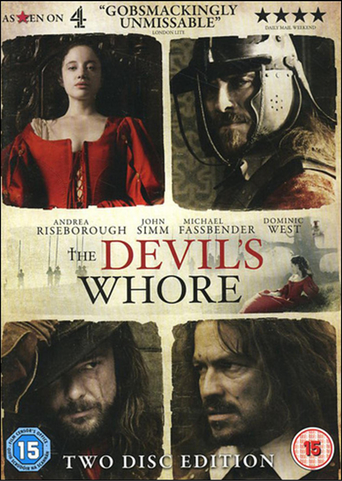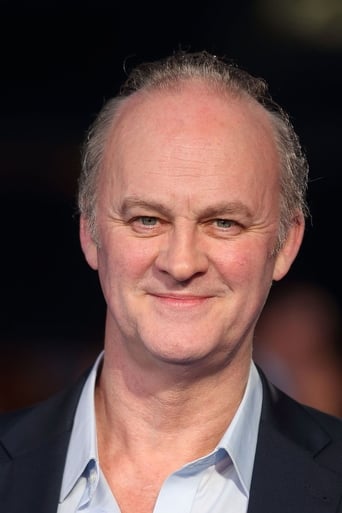Set between the years 1642 and 1660, "The Devil's Whore" charts the progress of the English Civil War through the eyes of the a 17 year old girl, the fictional Angelica Fanshawe.


Reviews
Look to the title - the devil has been added to be able to draw audiences in. And Angelica is a sort of English "Angelique" - a piece of human meat being dragged through history. modern dialog and modern terms are used. boring and primitive. subplots lead nowhere. but, okay, there is a amount of fighting going on. swordplay and blood. almost as bad as Tudors. avoid! this is not an epic tale of a young woman's life during the English Civil War, but a badly told romp.I think that the problem is, that the creators want to write a drama for women (: female protagonist) and men (: fighting, torture, male bonding). There is absolutely no artistic reason to create this movie. But I like all the parallels to "Angelique". avoid! I mean it!
The true story of Angelica Fanshawe, they say it is, but that is secondary to the real interest of this mini-series. Born close to the royal court of Charles I, married within that closed sanctuary, closed especially to what other people may think, and particularly repressive with all those that represented some kind of danger for the crown, she was confronted with a time when truth was the master word of everyone, love the premium of every one and yet the everyday reality was sectarianism and violence directed at all those who differed from you, no matter where you stood.Her story could be reduced to a series of husbands or to a series of man friends or to a series of failures with a successful birth at the end. That's what makes this film striking if not shocking at times with the extreme confrontation of the audience to excessive violence and all other types of executions, corporeal punishments, absolute deprivation of everything, victimization and injustice. And there is not one camp in this full array of differences that is better than the others.But I think this film goes a long way beyond these details and gritty small impressive elements. First of all it is rather clear on the "constitutional debate". The king is of divine nature and has no reason to share his power which is divine and absolute. Parliament, not clearly identified as the representative of the upcoming merchant bourgeoisie whose power was founded on the possession of the merchant fleet, of practically all ships in England, and the control over all sailors, is unable to get out of its small petty meaningless, except for them of course, effete and useless debate on some obtuse religious questions like predestination and the Eucharist, holy sacraments and contact with god, and eventually the right of the people (what people when parliament was elected by a few tens of thousands of propertied people?) to dismiss the king if his connection with the people (what people again.) got discontinued. They were no longer in touch, if they had ever been, with the needs and desires of simple people.The film insists in fact a lot on the Levelers, those people who defended the idea that the land was the property of those who tilled it and that everyone was supposed to share equally with everyone else. They were hunted by the king's men because they were seen as the most dangerous anti-royal enemies since they wanted the end of monarchy and the shift to an equalitarian republic. On the other side they were equally hunted by Cromwell's supporters because Cromwell was not for a republic, was a direct representative of the mercantile bourgeoisie and was against equal sharing, and yet at the same time he was not for a republic and believed deep in himself this country could only be one-handedly governed by a single man, which he resigned to do himself when no compromise could be found with the king.The film is absolutely silent, alas, on the various wars in their details: the two civil wars, and then the Irish war and then the Scottish war and then the war with Spain. The first two were against the king and ended with his bodily shortening. The next one was a bloody massacre based on the idea that Catholics had fallen down to lower than animals since they were able to let their own children starve, if not help them a little bit. The Scottish episode is not represented and the Spanish caper is not even mentioned because it confirmed a radical change that had started under Elizabeth I when she had to mobilize the country against Spain. In both cases the Parliament was the key to that demand because the owners of the ships and the employers of the sailors were all directly in parliament or represented in and by parliament. So Elizabeth gave some powers to parliament over taxation for example, in order to get what she wanted: ships and sailors. Cromwell went even further. He had to summon and convene a parliament he had violently disbanded.Why forget these events that are just coming to the beginning of the end in Ireland, that was solved in Scotland with devolution, and that is the basis of the tremendous move England was able to initiate in the Christian world towards a democratic parliamentary elective system that will take fifty years after the Glorious Revolution (1660) to establish fundamental human rights like Habeas Corpus, the freedom of the press and of publication. That's a shortcoming of great size in the film but that does not prevent us from feeling the happy ending of the Commonwealth in the Glorious Revolution that was to bring a new batch of difficulties and this time the peaceful revocation of the king by parliament in a law that will establish the first constitutional monarchy in the world, a real first step towards the American Revolution and then the French Revolution.After this period no one could say like Charles I: "Give me one instance of a king being dismissed by a parliament!" Charles I was the first in 1649. James II will be the second in 1688. That's really the end of feudalism and its theory of absolute kings by divine appointment.But nevertheless the show is beautifully filmed and grandiosely performed.Dr Jacques COULARDEAU
English period productions have a reputation for restraint. While it doesn't go as far as the almost-soap-opera The Tudors, restraint is not the watch-word in The Devil's Whore. Instead we have plenty of sex, violence and even a few demonic visions, with some history thrown in.Concerning the events of the English Civil War, the story is told through the eyes of a fictional young noblewoman, Angelica Fanshawe, played by Andrea Riseborough. Angelica somehow ends up experiencing almost every aspect of the civil war, born into privilege and a prominent place in Charles I's court, only to lose it all when her husband is executed. With her sympathy switched to the Levellers, Angelica becomes some sort of highwayman (sorry, highwaywoman) for a time, before marrying a senior figure of the Levellers, Thomas Rainsborough, (Michael Fassbender), only for her criminal past to catch up with her. When her husband is assassinated, Angelica herself narrowly escapes execution. And that's only the half of it.If you think this sounds far too convoluted to believe, well, you're right. Angelica's situation is far too convenient, to marry not one but two important figures of the English Civil war, to be on close terms with both the King and Cromwell, to consort with all manner of nobles, cavaliers, roundheads and puritans. It doesn't help that Angelica is firmly in the mold of other 'swashbuckling' heroines of pop culture such as Elizabeth of Pirates of the Caribbean and Arwen of LOTR, who, when not looking utterly ravishing in their gorgeous frocks are brandishing swords and smiting enemies. She also has a few politically correct orations of truth, justice and freedom to deliver. Riseborough delivers a passionate and sympathetic heroine, but at some point, her efforts are not enough to keep an eyebrow from being raised, particularly when Angelica storms into a church and begins pontificating about heaven and hell. Maxine Peake's portrayal of real-life figure Elizabeth Lilburne, wife of agitator John Lilburne, is a much more historically accurate figure: she is a wife utterly devoted to her husband and to his cause, and breaks a few conventions herself.When we do get round to the factual events they are impressively acted. Dominic West may look nothing like Oliver Cromwell but he makes him into a fascinatingly ambiguous character. In the first few episodes he seems willing to compromise with his fellow men, from Charles to his fellow revolutionaries, but as he gains more power he becomes a more ruthless, shadowy figure. Michael Fassbender and Tim Goodman-Hill are both excellent in their portrayal of men who passionately promote their causes. But who could forget the ever-versatile John Simm as Edward Sexby. Sexby is driven by obsessions, first for blood, which he is soon cured of, then by the cause of the Levellers which is soon corrupted, and finally in his determination to assassinate a tyrant. But his enduring obsession is with Angelica, and their romantic plot-line is probably the best distraction from fact that the drama has to offer. Simm and Riseborough have an excellent chemistry which the writers draw out through the series.Ultimately, should you wish to know more about the English Civil War you would be better to start with wikipedia than the Devil's Whore. But for those who like their dramas saucy, sordid and striking, The Devil's Whore has much in store.
I wasn't much of a fan of the English Civil War during History lessons at school. It was always difficult trying to decide which side to support. The glamorous, party loving Cavaliers or the serious, democratically minded, fair but boring round-heads....Watching The Devil's Whore I found my self switching sides again. However, kudos to Peter Flannery for making this period of history really interesting. This difficult period has never really been covered in movies or TV.The whole cast is absolutely amazing. Peter Capaldi is great as a doomed king, Michael Fassbender is intense and stunning as Rainsborough but my favourites are John Simm and Andrea Riseborough. Both act their socks off and make me want to keep watching. The chemistry, sparring and respect between Sexby and Angelica is fascinating! Almost perfect...











